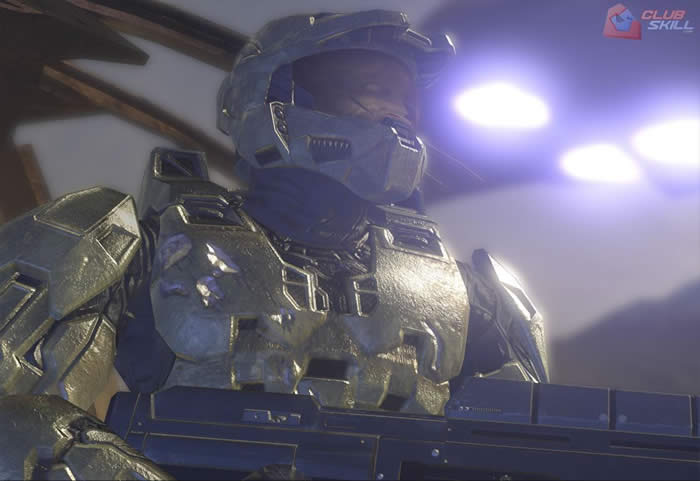Ilankai Tamil Sangam30th Year on the Web Association of Tamils of Sri Lanka in the USA |
|||
 Home Home Archives Archives |
Suicide Bombing Makes Sick Sense on Halo 3by Clive Thompson, Wired, November 5, 2007
I used to find it hard to fully imagine the mind-set of a terrorist. That is, until I played Halo 3 online, where I found myself adopting -- with great success -- terrorist tactics. Including a form of suicide bombing. I can't do those things. I haven't got enough time to practice as they do: I'm an adult, with a job and wife and kid, so I get maybe an hour with Halo on a good day. I wind up sucking far, far more than most other Halo 3 players, and despite the best attempts of Xbox Live to match me up with similarly lame players, I usually wind up at the bottom of my group's rankings -- stumbling haplessly about while getting slaughtered over and over again. So after a few weeks of this ritual humiliation, I got sick of it. And I devised a simple technique for revenge. Whenever I find myself under attack by a wildly superior player, I stop trying to duck and avoid their fire. Instead, I turn around and run straight at them. I know that by doing so, I'm only making it easier for them to shoot me -- and thus I'm marching straight into the jaws of death. Indeed, I can usually see my health meter rapidly shrinking to zero. But at the last second, before I die, I'll whip out a sticky plasma grenade -- and throw it at them. Because I've run up so close, I almost always hit my opponent successfully. I'll die -- but he'll die too, a few seconds later when the grenade goes off. (When you pull off the trick, the game pops up a little dialog box noting that you killed someone "from beyond the grave.") It was after pulling this maneuver a couple of dozen times that it suddenly hit me: I had, quite unconsciously, adopted the tactics of a suicide bomber -- or a kamikaze pilot. It's not just that I'm willing to sacrifice my life to kill someone else. It's that I'm exploiting the psychology of asymmetrical warfare. Because after all, the really elite Halo players don't want to die. If they die too often, they won't win the round, and if they don't win the round, they won't advance up the Xbox Live rankings. And for the elite players, it's all about bragging rights. I, however, have a completely different psychology. I know I'm the underdog; I know I'm probably going to get killed anyway. I am never going to advance up the Halo 3 rankings, because in the political economy of Halo, I'm poor. Specifically, I'm poor in time. The best players have dozens of free hours a week to hone their talents, and I don't have that luxury. This changes the relative meaning of death for the two of us. For me, dying will not penalize me in the way it penalizes them, because I have almost no chance of improving my state. I might as well take people down with me. Or to put it another way: The structure of Xbox Live creates a world composed of two classes -- haves and have-nots. And, just as in the real world, some of the disgruntled have-nots are all too willing to toss their lives away -- just for the satisfaction of momentarily halting the progress of the haves. Since the game instantly resurrects me, I have no real dread of death in Halo 3. I do not mean, of course, to trivialize the ghastly, horrific impact of real-life suicide bombing. Nor do I mean to gloss over the incredible complexity of the real-life personal, geopolitical and spiritual reasons why suicide bombers are willing to kill themselves. These are all impossibly more nuanced and perverse than what's happening inside a trifling, low-stakes videogame. But the fact remains that something quite interesting happened to me because of Halo. Even though I've read scores of articles, white papers and books on the psychology of terrorists in recent years, and even though I have (I think) a strong intellectual grasp of the roots of suicide terrorism, something about playing the game gave me an "aha" moment that I'd never had before: an ability to feel, in whatever tiny fashion, the strategic logic and emotional calculus behind the act. And the truth is, I'm probably going to keep doing it. Because when it comes to online Halo -- I still suck. - - - Clive Thompson is a contributing writer for The New York Times Magazine and a regular contributor to Wired and New York magazines. Look for more of Clive's observations on his blog, collision detection. |
||
|
|||
 This probably bears some explanation. I'll begin by pointing out a basic fact: A lot of teenage kids out there play dozens of hours of multiplayer Halo a week. They thus become insanely good at the game: They can kill me with a single head shot from halfway across a map -- or expertly circle me while jumping around, making it impossible for me to land a shot, while they pulverize me with bullets.
This probably bears some explanation. I'll begin by pointing out a basic fact: A lot of teenage kids out there play dozens of hours of multiplayer Halo a week. They thus become insanely good at the game: They can kill me with a single head shot from halfway across a map -- or expertly circle me while jumping around, making it impossible for me to land a shot, while they pulverize me with bullets.